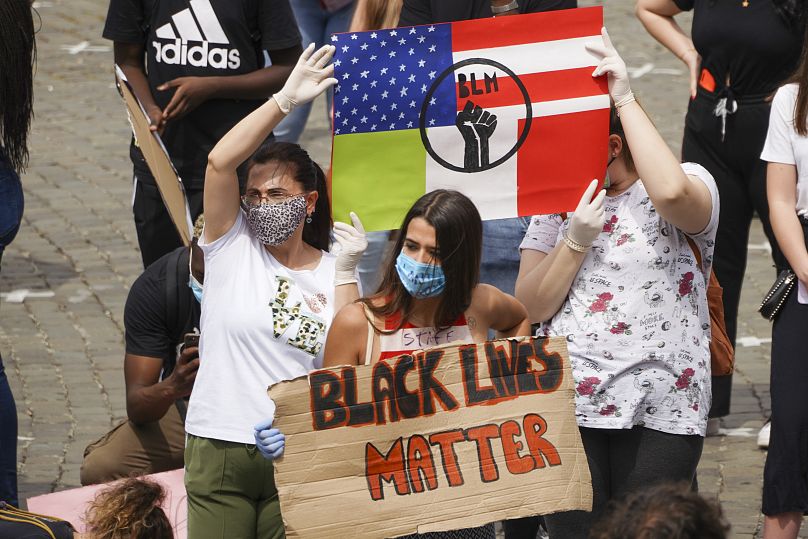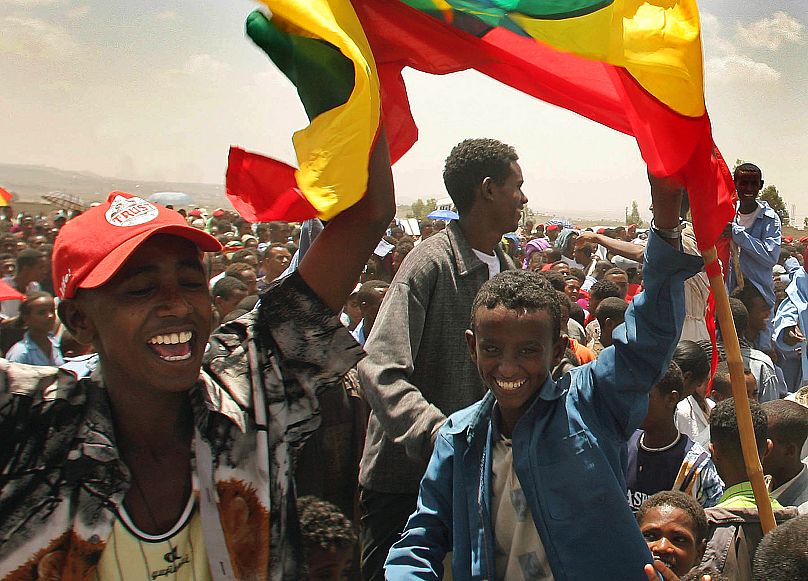A "culture of impunity" towards discrimination and the country's failure to come to terms with its colonial past has fuelled racism, say experts.
Mahnoor Euceph was travelling on a train in Italy’s Milan when she suddenly noticed a group of women making fun of her boyfriend and his mother.
The American tourist filmed the incident on her phone and then published it on TikTok, where the clip soon went viral.
“I was on the train from Lake Como to Milan on April 16th with my half-Chinese boyfriend, his Chinese mom, and his white dad. I am Pakistani. We are all American,” she wrote on the social media platform.
“I noticed these girls sitting across from us staring me down and laughing and speaking Italian. At first, I ignored it. Then I stared back at them,” she continued.
Euceph says she then took a nap but when she woke up, the women had not stopped staring.
“I asked them, ‘Is there a problem?’ They said, ‘No, there isn’t a problem’. At that point, they started saying ‘Ni hao (hello in Mandarin)!’ in an obnoxious, racist, loud voice, along with other things in Italian I couldn’t understand.”
Euceph said their taunts grew more aggressive until she took her phone and started filming. After that they slightly toned it down.
“Never in my life have I experienced such blatant racism. My boyfriend said the same thing,” she wrote, adding other Asian friends had reached out to her, sharing similar experiences of racism in Italy and Europe.
The video has fuelled an ongoing national conversation on racism within Italy, with its society becoming increasingly multicultural in recent years, especially in the biggest cities.
How common are episodes of racism in Italy?
Episodes of racism are quite common in Italy, often sparking widespread public condemnation in their aftermath.
In February, during a popular music contest, volleyball player Paola Egonu, who was born in Italy to Nigerian parents, said the country is racist, "but it’s getting better".
Only a few weeks ago, her optimism wasn’t shared by French former professional footballer Lilian Thuram, who told Italian TV channel La7 Italy is “much more racist than it used to be before this government was in power.”
Thuram was talking about Giorgia Meloni’s right-wing coalition government, which won last year’s election.
Only last week, Turin filed 171 restraining orders against Juventus fans after they subjected rival football player Romelu Lukaku to racist chants.
However, the Italian government does not collect statistics about race and ethnicity, meaning there is less data on racism compared to other European countries.
In 2021, some 60% of young people in Italy admitted to having some unconscious racist bias, as shown by a UNICEF poll. The survey also found that 74% of migrants interviewed by the agency reported had been subject to discrimination in Italy.
“There is a stronger awareness among recently settled communities and migrant communities about the growth, in the past two years, of episodes of daily racism,” Francesco Strazzari, professor in International Relations at the Pisa-based Scuola Universitaria Superiore Sant'Anna, told Euronews.
These incidents can be subtle, like a person subtly clutching their bag when they see a Black or Brown person entering a shop, or evident verbal and physical abuse.
“There have been recent episodes of totally gratuitous violence by far-right groups that intimidated migrants, and episodes of apparently unrelated street violence which still targeted migrants,” Strazzari said.
“There was a case in Rome of a Roma mother carrying a baby, and the baby was harmed by someone passing by and shooting. And in these cases, it’s hard to clearly determine whether it’s a racist act or not.”
According to Strazzari, a culture of impunity has developed alongside recent racist episodes in Italy.
There is racism that comes in the form of “public behaviour which hides behind mass behaviour or anonymity,” he said.
The racist chant of Juventus fans against Lukaku is one example, while social media is flooded with “cynical comments written under a false name” every time a migrant boat sinks in the Mediterranean, he adds.
“These are... very widespread or common forms of racism that you see in Italy, which are not sanctioned in any way,” Strazzari said. “And this culture of impunity, I think, legitimates the fact that there are more intangible forms in daily life which escape the attention of the daily citizen, but shift the attention of those who experience them.”
One of the three women in Euceph’s video later reached out saying the situation had been misunderstood and their behaviour wasn’t racist.
She apologised to her and her family, though the American tourist called it an attempt to manipulate the situation.
The ghost of Italy’s colonial past
Strazzari thinks Italy's complex past and its official approach to history and identity impact debates around racism, as well as people’s attitudes.
“Italy remains a country with a colonial past which was never properly addressed,” he said.
One of the worst massacres of the colonial period was committed by Italians in Ethiopia in February 1937, when an estimated 19,000 locals were murdered in what’s known as the Addis Ababa massacre.
Italian forces in the East African country committed what would now be considered war crimes, including using chemical weapons.
“Italy never formally apologised,” Strazzari said. “It’s important because Meloni visited Ethiopia recently."
He pointed out that Rome had tried to reconcile with Ethiopia by returning the Obelisk of Axum, which was taken in 1937.
While Italy's President Oscar Luigi Scalfaro expressed displeasure and sorrow for the crimes perpetrated in Ethiopia during the war in 1997, there was never a formal apology.
The roots of racism in Italy are to be found in this unresolved past, Strazzari said.
While Germany went through a process of scrutinising its history, values and identity after World War II, Italy “despite being another loser of the war, never had this kind of reckoning,” he said.
“In Italy, there’s the beloved cliché that Italians are always ‘brava gente’ (good people) - who even during World War II or colonial times, were always animated by a sense of empathy.”














